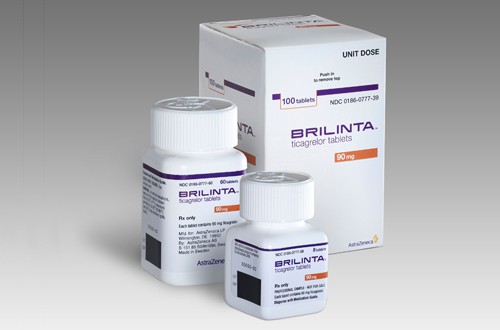
AstraZeneca (AZ) took a step closer to meeting its ambitious objectives for antiplatelet agent Brilinta after reporting significant benefits in a cardiovascular outcomes study.
The results of the PEGASUS-TIMI 54 study showed that two doses (60mg and 90mg) of Brilinta (ticagrelor) reduced major cardiovascular thrombotic events in patients who had suffered a heart attack between one and three years previously.
Brilinta – which is sold as Brilique in Europe – is a cornerstone of AZ’s plan to almost double its annual revenues to $45bn in 2023, announced during its defence against Pfizer’s $106bn hostile takeover move last year.
The company has a sales target of $3.5bn-a-year for the product by 2023, which would represent a massive advance on the $343m reported for the product in the first nine months of 2014, even though that was a near 80% increase on the same period of 2013.
To meet that target AZ needs Brilinta to be firing on all cylinders, and the positive PEGASUS-TIMI 54 data adds to the earlier PLATO trial results in showing that the drug has a role in the longer-term prevention of cardiovascular events, helping to meet that objective.
At the moment Brilinta is not approved for secondary prevention of atherothrombotic events in patients with a history of heart attack beyond one year, so the new data could support a label extension that will be filed later this year.
AZ also has additional trials ongoing of Brilinta in the prevention of cardiovascular events in patients with peripheral arterial disease, ischaemic stroke or transient ischaemic attack, and in patients with diabetes and coronary atherosclerosis.
Brilinta was first launched in 2011 as potential successor to Sanofi’s formerly $7bn-a-year antiplatelet brand Plavix (clopidogrel), which saw its sales decimated by generic competition after key patents expired in 2012.
Almost immediately after it was introduced however, AZ’s product faced concerns about the reliability of data in the PLATO trial, specifically a disparity between the effectiveness of the drug in the US and elsewhere, which eventually escalated into a full-blown inquiry by the US Department of Justice (DoJ) into the conduct of the study.
The DoJ eventually concluded last August that there was no case for AZ to answer in its handling of the trial, freeing AZ up to renew a push behind the product.




